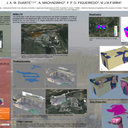[Neuroprotection strategies: effect of vinpocetine in vitro oxidative stress models].
Palabras clave
Abstracto
Reactive oxygen species (ROS) play an important role in neuronal damage and death that occurs in several neurodegenerative disorders, namely in Alzheimer's disease (AD). The observation that ROS neutralization may slow or reduce the neurodegenerative process associated with those pathologies stimulates the development of new drugs, more efficient and well tolerated, with antioxidant properties. Vinpocetine [14-etoxicarbonyl-3alpha,16alpha-ethyl)-14,15-eburnamine], a vincamine derivative, efficiently protects cells from ROS attack. Recently, the protective effect of vinpocetine was demonstrated using in vitro models of oxidative stress induced by the oxidant pair ascorbate/Fe2+ and by synthetic peptides of the AD-associated b-amyloid protein (Abeta). Results obtained from these in vitro experiences support that additional clinical trials should be carried out using vinpocetine, or vinpocetine derivatives, in order to test its therapeutical or preventive effects in diseases where oxidative stress plays a crucial role.



